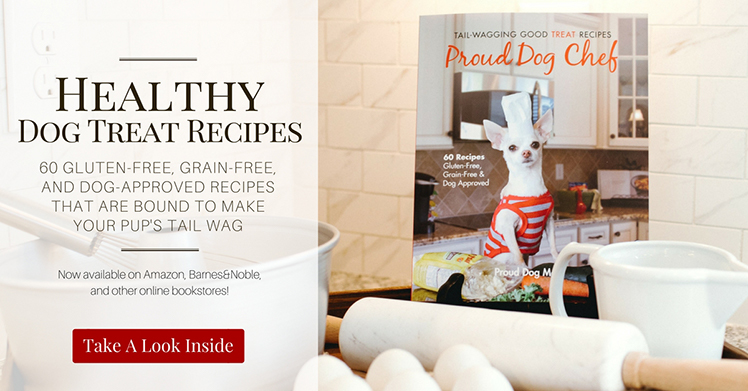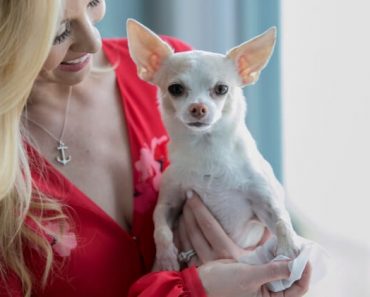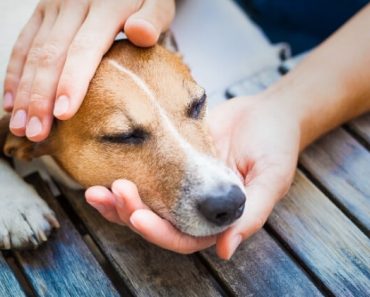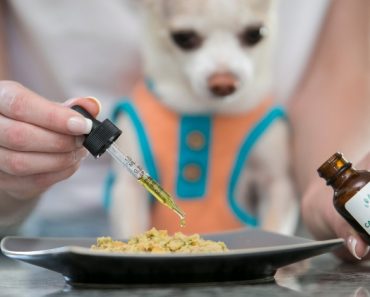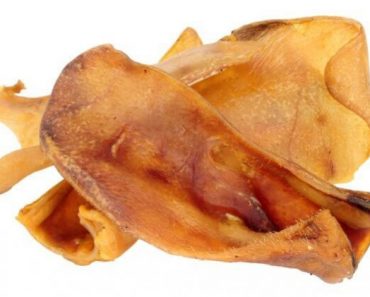When it comes to health foods, it seems like kale is king. Often called one of the most nutritious plant foods on the plant, this flavorful, dark leafy green went from a random garnish to “it” superfood. Between the abundance of kale salads, sauteed side options, and even green kale smoothies on the market, it’s obvious this super veg is great for people. But, today’s question is: Can dogs eat kale?
Short Answer: For most dogs, yes! But there are some things you should know before feeding it to your pooch.
What Is Kale?
Kale is a cruciferous vegetable and member of the cabbage family. That means it’s related to other popular superfoods, like broccoli! A walk down your local grocery store aisle and you may spot a few different types. Some have green leaves, others have purple. Some leaves are flat, while others are curly. The most common type of kale is called curly kale — it’s green, has curly leaves, and has a stiff, fibrous stem.

A Look At The Nutritional Value
When feeding this nutritional powerhouse to your pooch, moderation is key. We’ll go over why below. But, first, let’s take a look at the many nutrients it packs inside.
According to the U.S. Department of Agriculture, 1 cup (about 21 grams) of raw kale has:
- Water – 84%
- Calories – 7
- Protein – 0.6g
- Carbohydrate – 0.9g
- Fiber – 0.9g
- Calcium – 53.3mg
- Iron – 0.336mg
- Magnesium – 6.93mg
- Phosphorus – 11.6mg
- Potassium – 73.1mg
- Sodium – 11.1mg
- Zinc – 0.082mg
- Folate – 13µg
- Carotene, beta – 603µg
- Vitamin A – 50.6µg
- Vitamin B-6 – 0.031mg
- Vitamin C – 19.6mg
- Vitamin E – 0.139mg
- Vitamin K – 81.8µg
Top Health Benefits Of Kale
- Anti-Inflammatory – Kale contains antioxidants that fight inflammation.
- Anti-Cancer – Kale is loaded with compounds that are believed to protect against cancer. Its antioxidants help fight against free-radicals in the body (AKA unstable molecules that can damage cells). If there are too many free radicals in the body, it can lead to chronic disease. Experts link free radicals to various illnesses, including cancer.
- Digestion – Kale is another fibrous veggie. Fiber supports digestion and helps slow the digestive process, allowing the body to absorb more vital nutrients.
- Liver Health – This “queen of greens” is known as a great detoxifying food.
- Heart Health – There are various nutrients in kale that support heart health, including fiber and potassium.
- Blood – Kale offers up high amounts of vitamin K, which aids the overall health of blood (it plays a role in clotting and beyond).
- Eye Health – The Beta Carotene in this superfood (which the liver converts to Vitamin A) aids in maintaining and improving eye health. Experts say kale’s eye health benefits also come from the carotenoids lutein and zeaxanthin. They’re said to protect a dog’s retina — the light-sensitive inner wall of the eye — from oxidative damage.
- Great for Bones & Muscles – Kale offers up high amounts of calcium and vitamin K, both contribute to building strong bones. Plus, calcium benefits your dog’s muscles. *Calcium is essential in your dog’s diet but too much can result in kidney issues.
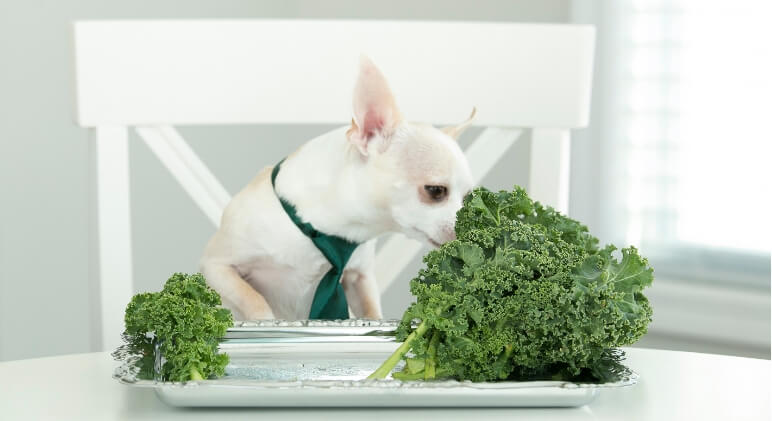
The Drawbacks: Don’t “Kale” My Vibe
Along with all of the many benefits, kale also contains several potentially harmful natural compounds that should be highlighted. Keep in mind, for the average, healthy dog, kale is safe. Many holistic veterinarians, pet nutrition experts, and high-end dog food brands say it’s all about feeding in moderation and constantly rotating which nutrient-rich veggies your dog is munching.
Calcium oxalate – Dogs who are prone to kidney or bladder stones should avoid foods with high calcium oxalate contents because they have been shown to aid in the formation of kidney and bladder stones. The good news? Boiling kale significantly reduces calcium oxalates. They’re also reduced when steamed or cooked. If your fur kid is prone to kidney or bladder stones, consult with your veterinarian about which foods your dog should avoid.
Isothiocyanates – Let’s start with the positive: Isothiocyanates have been associated with a lower risk of cancer. Now the bad news: They can cause gastric irritation in dogs — gas, stomach ache, or diarrhea. In moderation, your dog should be fine. But, when introducing kale (or any food) into your dog’s diet, do so very slowly to see how he handles it.
Thallium – While rare, this heavy metal could be harmful if enough is consumed. In a Dogs Naturally Magazine article, Dr. Karen Becker addressed this concern. She said: “Follow your grandma’s advice: everything in moderation! The crucifers are the warrior veggies that knock out cancer; don’t deny your dogs the benefits of the indole-3-carbinol found in these healing foods, but use them in rotation. Buy crucifers grown in organic soil to avoid thallium contamination from environmental pollutants.“
In large amounts, kale can also affect thyroid function. If your dog has pre-existing thyroid issues, you vet may recommend avoiding kale, along with all cruciferous veggies. Or, your vet may recommend at least keep them to a minimum. Don’t feed kale raw and ditch the kale the hard ribs.
Feeding Tips
Experts recommend buying organic kale and washing it well before feeding it to your dog (or you!). It’s recommended to feed cooked vs raw and avoid feeding the hard ribs.
As stressed throughout this article, moderation and veggie rotation is key. When it comes to offering this leafy green to your pooch, make sure to review your dog’s diet with a zoomed out lens. For example, since my two dogs eat small amounts of cooked kale in some of their meals, I’m careful when I offer a kale treat.
If you home cook for your dog, a little boiled or steamed chopped kale may make a great addition to their food bowl. It’s an ingredient many high-end dog food brands — like The Farmer’s Dog, NomNomNow, and Ollie — include in their recipes.
If feeding kale as a treat, I either make homemade plain kale chips (recipe in my cookbook, Proud Dog Chef: Tail-Wagging Good Treat Recipes) or chop up a small amount and add it to biscuits. I sometimes add chopped kale to my Doggy Veggie Frittatas and my KONG stuffings.

When first introducing kale into your pup’s diet, do so slowly. If you have any questions or concerns, consult with your veterinarian!


